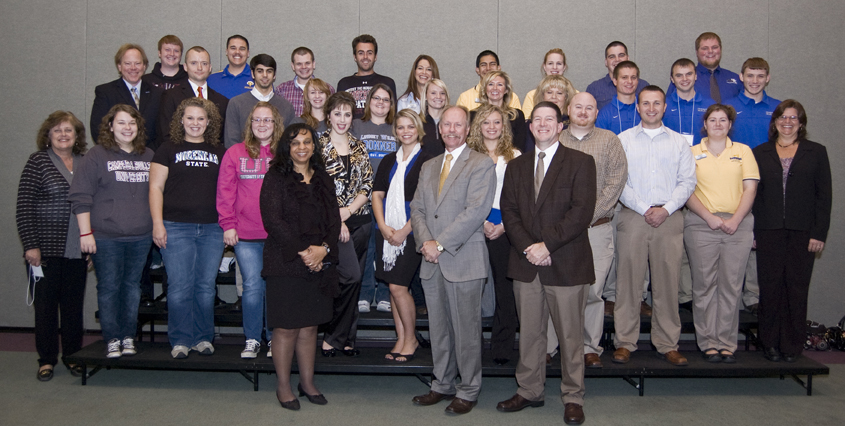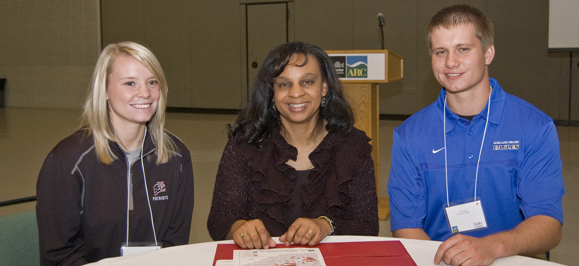 To get a deeper understanding of issues in Southern and Eastern Kentucky that often lead young people to leave the largely rural region, The Center for Rural Development’s Higher Education Consortium went to the source—today’s college students who may still be undecided on their post-graduation plans.
To get a deeper understanding of issues in Southern and Eastern Kentucky that often lead young people to leave the largely rural region, The Center for Rural Development’s Higher Education Consortium went to the source—today’s college students who may still be undecided on their post-graduation plans.
A total of 35 students from 10 Kentucky colleges and universities met this week at The Center in Somerset to continue a discussion started by their peers in 2009 on issues that contribute to the out-migration of many of the region’s best and brightest students.
During the 2011 Collegiate “Insight and Dialogue Engaging Appalachian Students” (IDEAS) Summit, college representatives addressed challenges and possible solutions for how to retain youth and keep more future leaders in Southern and Eastern Kentucky.
Nicholas Lawson, a junior at Alice Lloyd College, said the region needs more job opportunities for college graduates.
“People will go where they can find work, and it is important that it is provided in the area of their region,” Lawson said.
“I want to invest in my own community before I invest in other communities,” Kayla Smith, a sophomore at the University of the Cumberlands, added. “I feel God has called me to stay close to home for a while, which I am quite okay with.”
The Summit, presented by the Appalachian Regional Commission (ARC) and The Center, drew participants from counties designated as distressed by the ARC to discuss key issues in educational attainment, entrepreneurship, economic development, and health and wellness.
“One of the greatest resources our region has to offer is our young people,” Dr. Joseph “Joe” L. Fink III, chairman of the Higher Education Consortium, said. “By capitalizing on their ideas and solutions today to retain their generation in Appalachia, we are that much closer to transforming Southern and Eastern Kentucky with our ‘homegrown talent.’’
While being led by their peers in breakout sessions, participants were encouraged to freely share their thoughts and concerns on the event’s key issues. This input is critical toward the belief of U.S. Congressman “Hal” Rogers (KY-05) that “no young person should have to leave home to find his or her future.”
“I have always touted the raw talents of our young people in Southern and Eastern Kentucky,” Rogers said. “This Summit gives us a chance to recognize the students in our region who are using their talents to give back to their communities and improve their own futures.”
“It is encouraging to see our young people being the catalyst for change,” Lonnie Lawson, president and CEO of The Center, added. “Their passion and commitment to making Southern and Eastern Kentucky a better place to live and work for themselves and others speaks volumes.”
Suggested action steps developed by student participants at the Summit will be shared with participating colleges and universities and local communities.
“Our students today are the Appalachia of tomorrow,” said Summit keynote speaker Dr. Ann Lyttle-Burns, Clay County native and coordinator for Kentucky Educational Collaborative for State Agency Child (KECSAS) programs in Fayette County. “We must show them what services are needed in our region, and how their training can fulfill that need and improve the overall well-being of our community for our families that are currently there and future generations.”
Attending the summit were representatives from Somerset Community College, Alice Lloyd College, University of Kentucky, Eastern Kentucky University, University of the Cumberlands, Campbellsville University, Morehead State University, Hazard Community and Technical College, the University of Pikeville, and Lindsey Wilson College.
Comments from other students at the IDEAS Summit
“The only way Kentucky could keep me in the state is if they produce more state job opportunities.”
Kinzie Wells, Campbellsville University, sophomore
“Leaving Eastern and Southern Kentucky upon graduation would be a stellar adventure; however, leaving the area I was reared in would mean leaving behind my family and loved ones. It would also mean leaving behind the crisp, scenic bluegrass state that is enveloped in beauty.”
Mackenzie Teague, Eastern Kentucky University, sophomore
“There needs to be more responsibility placed on the younger generation to teach them life is not a free ride.”
Rhonda Bowen, Hazard Community and Technical College, sophomore
“This is my home. If I were planning to leave, a strong community and job opportunities would persuade me to stay.”
Nicole Pierce, Lindsey Wilson College, freshman
“Within the rural areas, it is hard to find fast broadband services, along with cell phone service. Especially with cell phones and 3G availability, it is very limited, and everyone should have the opportunity to have this service.”
Brandon Muncy, Morehead State University, senior
“There are a few jobs for a dietician, but they are few and very competitive.”
Laura Peterson, Somerset Community College, sophomore
“I don’t plan on leaving, but if I did plan on it, I would stay if there was a promised job that could hold up and be there all the time.”
Tara Smith, University of Kentucky, freshmanClick here to view other photos from the 2011 Collegiate Summit.





